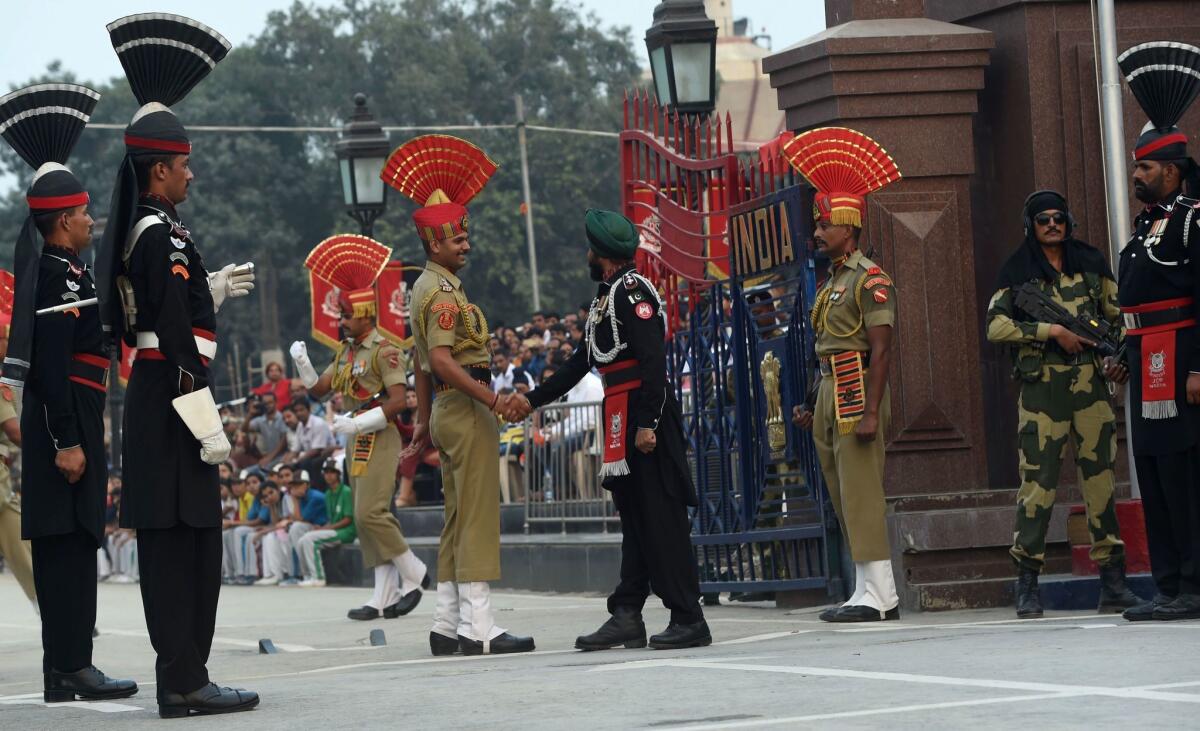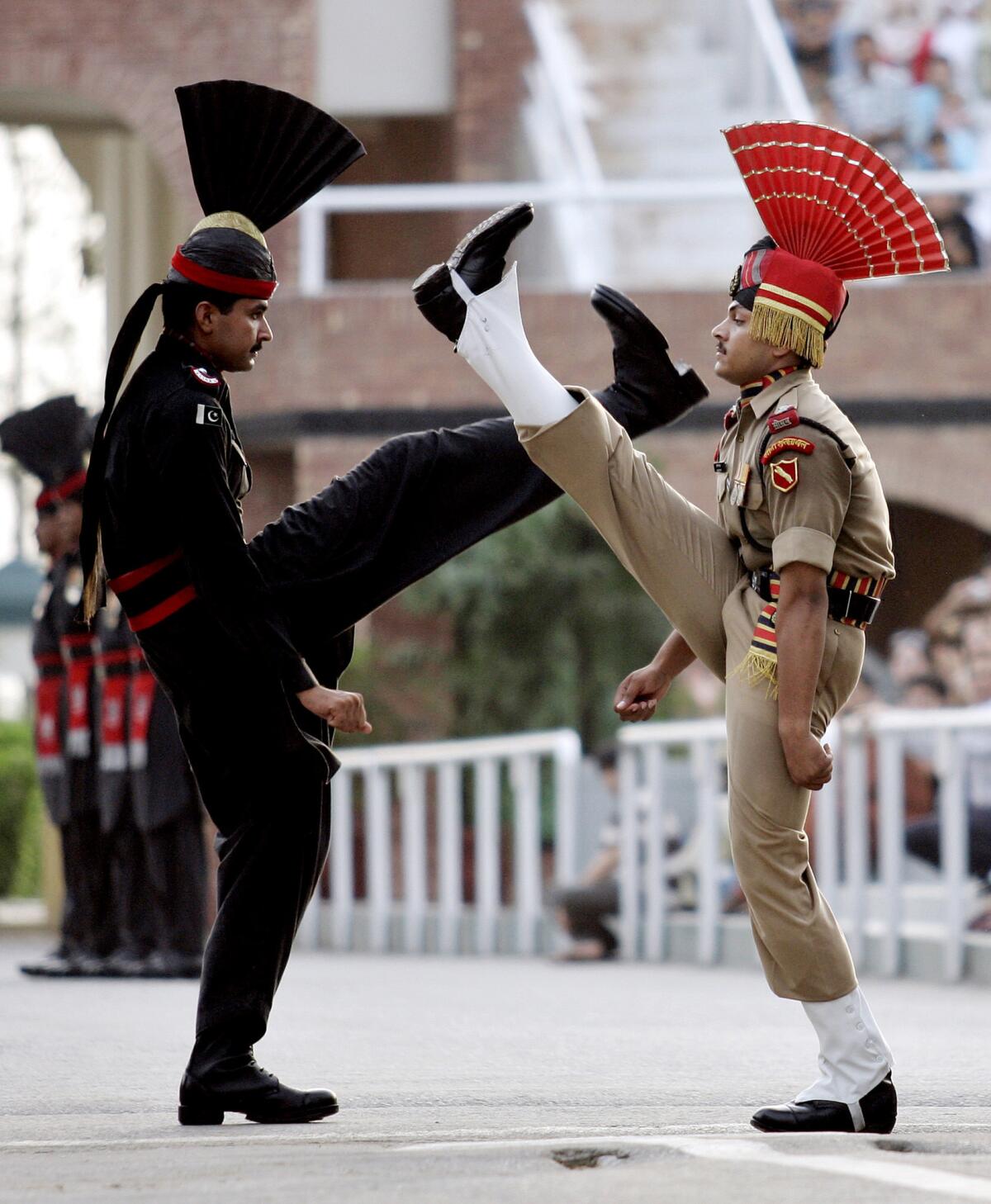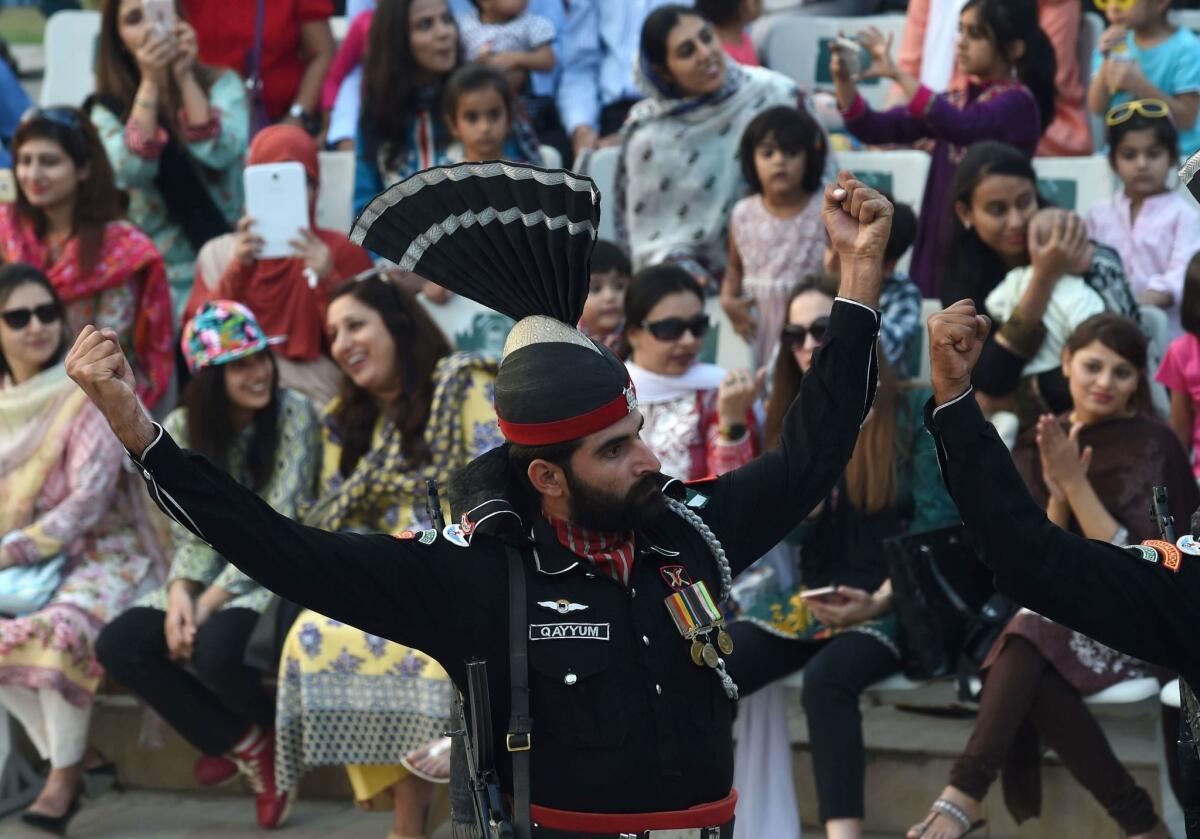On the Ground: The elaborate ceremony that says everything you need to know about India-Pakistan tensions

Reporting from Wagah, India-Pakistan Border — Towering soldiers wearing wide fantail hats face off across a pair of metal gates on one of the most heavily militarized borders in the world.
Then, to the blaring beats of patriotic songs, they swing their arms and high-kick like can-can dancers as hundreds of spectators cheer and snap selfies.
On one side, Indians; on the other, Pakistanis. It is a military display unlike perhaps any other in the world.
The heavily choreographed flag-lowering ceremony — macho and camp in equal measure — takes place every day at dusk at the countries’ main border crossing. The ritual has endured through half a century of diplomatic dust-ups, border skirmishes, economic warfare and mutual misunderstandings.
It’s like the halftime show at a USC-UCLA game — if the marching bands had 200-plus nuclear warheads aimed at each other.
India and Pakistan have waged three wars, launched a tit-for-tat nuclear arms race and squabbled over a 17,000-foot glacier, where hundreds of troops from each side have died in avalanches and extreme cold.
With hostilities between the rival nations flaring in the disputed territory of Kashmir, ostentatious nationalism is finding its moment in South Asia. India has made standing for the national anthem mandatory in its movie theaters, and Pakistan banned Indian films from its theaters for two months.
The daily to-do at the Wagah border post — noisy, jingoistic, somewhat confusing, full of bravado and elaborate gestures — mirrors the fraught relationship between the countries themselves, separated at birth in 1947 into predominantly Hindu India and predominantly Muslim Pakistan.
Wagah is where the Grand Trunk Road, an ancient lifeline of South Asia, intersects with the India-Pakistan border in Punjab, the fertile territory split by the British partition.

Visitors at the popular stop on the tourist circuit in both countries spend as much time sizing up the people sitting in the opposite set of bleachers as they do their own soldiers in uniform — green and khaki for India’s Border Security Force, black for Pakistan’s Rangers.
On the Indian side late one recent afternoon, beneath an orange sun suspended in a smog-brown sky, spectators alighting from their taxis and tour buses waded through a gantlet of vendors hawking “I Love My India” hats and face paint.
After standing in a lengthy security line, Indian visitors were corralled into single file by horse-mounted personnel of the Border Security Force — while foreigners and VIP guests took a fast lane to reserved seats at the front of the viewing area.
The flags of both countries, the Indian tricolor and the Pakistani green, were strung up tightly over the twin gates, which are opened every morning without major fanfare and remain open throughout the day until they are shut at the end of the ceremony.
Ice cream and bottled water were for sale, as if at a cricket match.
The crowd reflected the panoply of modern India: schoolchildren in rumpled uniforms, working-class men in their 20s with lean faces and trendy haircuts, well-off families in down vests and caps bearing the names of vacation destinations, young women from the villages in conservative saris and chunky gold earrings.
A disc jockey played a succession of pop songs with pro-India themes, prompting a cascade of children to wash down from the bleachers and start a dance party in the middle of the road where the ceremony would take place.

Families clapped and sang along to the familiar Bollywood lyrics. (“We snatch victory from every loss, we badly beat our enemies, we Indians.”) Some glanced over the pair of gates to the Pakistani side, a few hundred yards away, where spectators were taking their seats beneath a grave-faced portrait of Muhammad Ali Jinnah, the founder of the nation. There was no raucous dance circle, more men wore beards and traditional shalwar kameez, and women sat in a separate section of the stands.
“They look so different,” one well-dressed Indian woman in the VIP section said to the man next to her.
A white-clad master of ceremonies took the microphone and ordered the children back to their seats. The show was about to begin.
Two uniformed Indian soldiers in sunglasses and rifles slung across their chests suddenly appeared at the far end of the road. They twirled their sculpted mustaches and preened for a moment with their hands on their hips, then goose-stepped forward before coming to an abrupt stop before the open gate.
They pointed long glares at the Pakistani side — where soldiers were doing a similar bit of posturing, partly obscured from view.
The crowds went crazy. “Pakistan Zindabad (long live Pakistan)!” screamed one side; “Hindustan Zindabad!” the other.
A dozen Indian soldiers were next, marching so forcefully that scarlet fantails crowning their heads seemed like they would tumble to the ground, followed by two high-stepping female soldiers — an unsubtle dig at the gender segregation on the other side.
It went on like this for 20 minutes, each set of Indian soldiers seemingly taller and more imposing than the last. Some hurtled themselves toward the gate and flexed their biceps in a gesture that seemed more silly than menacing.
Finally, as the flags were lowered, one Indian and one Pakistani soldier performed an elaborate pas de deux, facing each other between the gates and offering a pair of sharp salutes, followed by high kicks that nearly brought their legs to their foreheads, and ending with a perfunctory handshake. Each marched back to his side as the gates swung shut with a clang — not to be reopened until the morning.
Few travelers cross the border this way, as there is next to no tourism between the countries. The closing of the gates, officially known as “Beating Retreat,” is almost entirely symbolic, modeled on a British military ceremony that calls patrolling units back to their bases.
The spectacle has taken place since 1959 with growing crowds and few interruptions. In November 2014, a suicide bombing on the Pakistani side of the border killed more than 50 people shortly after the ceremony — but it went on the following day.
Yet the recent tensions have added an edge. In September, after Indian forces carried out strikes in Pakistan to avenge a raid on an army base, the Border Security Force suspended its participation for three days.
“With escalating tension on the border, the aggression in the ceremony increases,” said Mubasher Bukhari, a Pakistani security analyst. “More people attend and shout slogans with more intensity. It makes it ferocious — and to some extent ludicrous, like the war is being fought at the Wagah border.”
Sushant Singh, a military affairs expert and associate editor of the Indian Express, has called the display “outrageous” and argued for it to be canceled on the grounds that it promotes anti-Pakistan sentiment.
“It makes no sense,” Singh said. “You could have film actors doing it. There is no reason for a professional force to be spending so much time and energy doing something that has so little value — except for the fact it creates great PR for the Border Security Force.”
Yet judging from the awed faces among the spectators who filed out of the stands at dusk, the ceremony remains popular.
“It’s paying respect to our troops,” said Gurpreet Gill, a 28-year-old software engineer from New Delhi who attended with his wife. “It’s serious but it’s also lighthearted. It’s not like the two sides are going to start fighting each other here at Wagah.”
Special correspondent Aoun Sahi contributed to this report from Islamabad, Pakistan.
Follow @SBengali on Twitter for more news from South Asia
ALSO
A rocky visit to Taiwan for Hong Kong pro-democracy leader Joshua Wong
The ‘Krispy Kreme Familia’ and the black market doughnuts of Juarez
He was proud to be the father of an enormous family — until he couldn’t feed them
More to Read
Sign up for Essential California
The most important California stories and recommendations in your inbox every morning.
You may occasionally receive promotional content from the Los Angeles Times.











